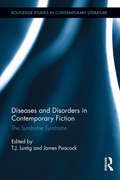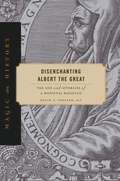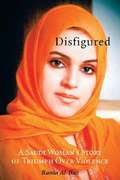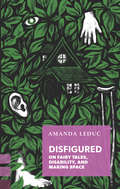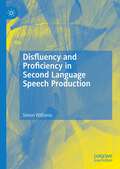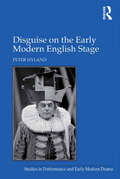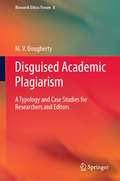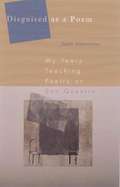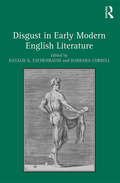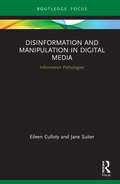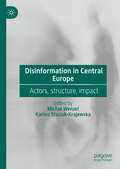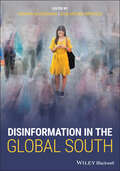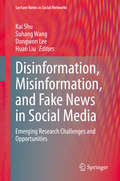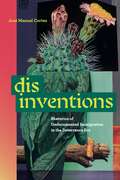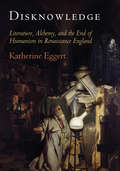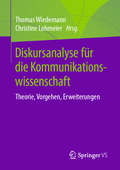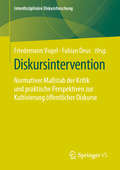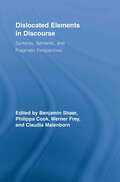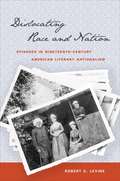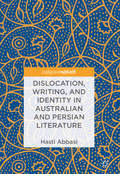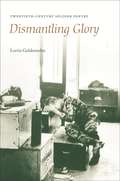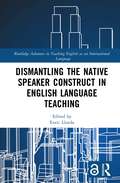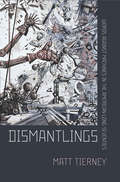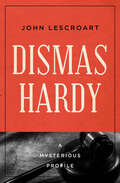- Table View
- List View
Diseases and Disorders in Contemporary Fiction: The Syndrome Syndrome (Routledge Studies in Contemporary Literature #10)
by James Peacock T. J. LustigThe essays in this collection address the current preoccupation with neurological conditions and disorders in contemporary literature by British and American writers. The book places these fictional treatments within a broader cultural and historical context, exploring such topics as the two cultures debate, the neurological turn, postmodernism and the post-postmodern, and responses to September 11th. Considering a variety of materials including mainstream literary fiction, the graphic novel, popular fiction, autobiographical writing, film, and television, contributors consider the contemporary dimensions of the interface between the sciences and humanities, developing the debate about the post-postmodern as a new humanism or a return to realism and investigating questions of form and genre, and of literary continuities and discontinuities. Further, the essays discuss contemporary writers’ attempts to engage the relation between the individual and the social, looking at the relation between the "syndrome syndrome" (referring to the prevalence in contemporary literature of neurological phenomena evident at the biological level) and existing work in the field of trauma studies (where explanations tend to have taken a psychoanalytical form), allowing for perspectives that question some of the assumptions that have marked both these fields. The current literary preoccupation with neurological conditions presents us with a new and distinctive form of trauma literature, one concerned less with psychoanalysis than with the physical and evolutionary status of human beings.
Disenchanting Albert the Great: The Life and Afterlife of a Medieval Magician (Magic in History)
by David J. Collins, S. J.Albert the Great (1200–1280) was a prominent Dominican friar, a leading philosopher, and the teacher of Thomas Aquinas. He also endorsed the use of magic. Controversial though that stance would have been, Albert was never punished or repudiated for what he wrote. Albert’s reception followed instead a markedly different course, leading ultimately to his canonization by the Catholic Church in 1931. But his thoughts about magic have been debated for centuries. Disenchanting Albert the Great takes Albert’s contested reputation as a case study for the long and complex history surrounding the concept of magic and magic’s relationship to science and religion. Over the centuries, Albert was celebrated for his magic, or it was explained away—but he was never condemned. In the fifteenth century, members of learned circles first attempted to distance Albert from magic, with the goal of exonerating him of superstition, irrationality, and immorality. Disenchanting Albert the Great discusses the philosopher’s own understanding of magic; an early, adulatory phase of his reputation as a magician; and the three primary strategies used to exonerate Albert over the centuries. In the end, Disenchanting Albert the Great tells the story of a thirteenth-century scholar who worked to disenchant the natural world with his ideas about magic but who himself would not be disenchanted until the modern era. This accessible and insightful history will appeal to those interested in Albert the Great, Catholic Church history, the history of magic, and Western understandings of the natural and the rational over time.
Disfigured: A Saudi Woman's Story of Triumph over Violence
by Catherine Spencer Rania Al-BazEvery morning for the past six years, Rania al-Baz has been the smiling face of a family program on Saudi television. She was a young, beautiful Saudi TV new anchor-the first woman to have such a job-when her abusive husband beat her into a coma and left her for dead. She remained in a coma for four days and later underwent thirteen operations to reconstruct her face. When she agreed to let horriying pictures of her ravaged face be made public, her story sparked general criticism of Saudi culture. A month after the tragedy, the first Saudi research into domestic violence began at King Saud University in Riyadh. Rania's story subsequently appeared in the press all over the world.
Disfigured: On Fairy Tales, Disability, and Making Space (Exploded Views)
by Amanda LeducFairy tales shape how we see the world, so what happens when you identify more with the Beast than Beauty? If every disabled character is mocked and mistreated, how does the Beast ever imagine a happily-ever-after? Amanda Leduc looks at fairy tales from the Brothers Grimm to Disney, showing us how they influence our expectations and behaviour and linking the quest for disability rights to new kinds of stories that celebrate difference. "Leduc persuasively illustrates the power of stories to affect reality in this painstakingly researched and provocative study that invites us to consider our favorite folktales from another angle." —Sara Shreve, Library Journal
Disfluency and Proficiency in Second Language Speech Production
by Simon WilliamsThis book explores the concept of disfluency in speech production, particularly as it occurs in the context of second language acquisition. Drawing on examples from learner speech at three levels (beginner, intermediate and advanced), the author argues that acquiring target language norms for performing disfluency is essential to an individual being recognized as fluent in a language by fellow-speakers. Starting with a survey of the psycholinguistic research in this area, he then applies a sociolinguistic lens to examine how a learner's social and educational background impacts the types of disfluencies in their speech. This book will be of interest to readers in fields such as (applied) linguistics and second language acquisition, psychology and education.
Disguise on the Early Modern English Stage (Studies in Performance and Early Modern Drama)
by Peter HylandDisguise devices figure in many early modern English plays, and an examination of them clearly affords an important reflection on the growth of early theatre as well as on important aspects of the developing nation. In this study Peter Hyland considers a range of practical issues related to the performance of disguise. He goes on to examine various conceptual issues that provide a background to theatrical disguise (the relation of self and "other", the meaning of mask and performance). He looks at many disguise plays under three broad headings. He considers moral issues (the almost universal association of disguise with "evil"); social issues (sumptuary legislation, clothing, and the theatre, and constructions of class, gender and national or racial identity); and aesthetic issues (disguise as an emblem of theatre, and the significance of disguise for the dramatic artist). The study serves to examine the significant ways in which disguise devices have been used in early modern drama in England.
Disguised Academic Plagiarism: A Typology and Case Studies for Researchers and Editors (Research Ethics Forum #8)
by M. V. DoughertyThis volume is the first book-length study of disguised forms of plagiarism that mar the body of published research in humanities disciplines. As a contribution to applied research ethics, this practical guide offers a typology of the principal forms of disguised plagiarism. It provides detailed analyses, in-depth case studies, and useful flow charts to assist researchers, editors, and publishers in protecting the integrity of the body of published research literature. Disguised plagiarism is more subtle than copy-and-paste plagiarism; all its varieties involve some additional concealment that creates further distance between the plagiarizing text and its source. These disguised forms are the most difficult forms of plagiarism to detect. Readers of the volume will become acquainted with the subtler forms of plagiarism that corrupt the production and dissemination of knowledge in humanities fields. The book is valuable not only to those interested in research ethics, but also to those in humanities fields including philosophy, theology, and history.
Disguised as a Poem: My Years Teaching Poetry at San Quentin
by Judith TannenbaumMemoir of teaching poetry at a California prison. Includes some of the prisoners' poems.
Disgust in Early Modern English Literature
by Natalie K. Eschenbaum Barbara CorrellWhat is the role of disgust or revulsion in early modern English literature? How did early modern English subjects experience revulsion and how did writers represent it in poetry, plays, and prose? What does it mean when literature instructs, delights, and disgusts? This collection of essays looks at the treatment of disgust in texts by Spenser, Shakespeare, Donne, Jonson, Herrick, and others to demonstrate how disgust, perhaps more than other affects, gives us a more complex understanding of early modern culture. Dealing with descriptions of coagulated eye drainage, stinky leeks, and blood-filled fleas, among other sensational things, the essays focus on three kinds of disgusting encounters: sexual, cultural, and textual. Early modern English writers used disgust to explore sexual mores, describe encounters with foreign cultures, and manipulate their readers' responses. The essays in this collection show how writers deployed disgust to draw, and sometimes to upset, the boundaries that had previously defined acceptable and unacceptable behaviors, people, and literatures. Together they present the compelling argument that a critical understanding of early modern cultural perspectives requires careful attention to disgust.
Disinformation and Manipulation in Digital Media: Information Pathologies (Routledge Focus on Communication and Society)
by Jane Suiter Eileen CullotyDrawing on research from multiple disciplines and international case studies, this book provides a comprehensive and up-to-date understanding of online disinformation and its potential countermeasures. Disinformation and Manipulation in Digital Media presents a model of the disinformation process which incorporates four cross-cutting dimensions or themes: bad actors, platforms, audiences, and countermeasures. The dynamics of each dimension are analysed alongside a diverse range of international case studies drawn from different information domains including politics, health, and society. In elucidating the interrelationship between the four dimensions of online disinformation and their manifestation in different international contexts, the book demonstrates that online disinformation is a complex problem with multiple, overlapping causes and no easy solutions. The book’s conclusion contextualises the problem of disinformation within broader social and political trends and discusses the relevance of radical innovations in democratic participation to counteract the post-truth environment. This up-to-date and thorough analysis of the disinformation landscape will be of interest to students and scholars in the fields of journalism, communications, politics, and policy as well as policymakers, technologists, and media practitioners.
Disinformation in Central Europe: Actors, structure, impact
by Michał Wenzel Karina Stasiuk-KrajewskaThis book presents different approaches to disinformation based on original data from quantitative and qualitative studies conducted within CEDMO (Central European Digital Media Observatory). The linguistic and visual features of this type of communication are analyzed in the context of the discursive and genre framing of fake news. The authors discuss the psychological mechanisms of the reception of manipulated content, as well as the legal and political contexts of disinformation in Central Europe (Poland, the Czech Republic, Slovakia). The book presents the results of comparative research on attitudes to Covid-19 and the war in Ukraine, linking the two. The volume contains not only empirical studies, but also an elaborate proposal for a theoretical approach to manipulated content and a coherent methodological model that can be used to deepen scientific knowledge of this complex area of study.
Disinformation in the Global South
by Herman Wasserman Dani Madrid-MoralesA timely and incisive exploration of disinformation and its impact in the Global South In Disinformation in the Global South, media and communications scholars Herman Wasserman and Dani Madrid-Morales deliver a unique and geographically diverse collection of perspectives on the phenomenon of disinformation as it manifests in the Global South. In many parts of the Global South, coordinated political disinformation campaigns, rumor, and propaganda have long been a part of the social fabric, even before disinformation has become an area of scholarship in the Global North. The way disinformation manifests in this region, and responses to it, can therefore be highly instructive for readers around the world. Through case studies and comparative analyses, the book explores the impact of disinformation in Africa, Latin America, the Arab World and Asia. The chapters in this book discuss the similarities and differences of disinformation in different regions and provide a broad thematic overview of the phenomenon as it manifests across the Global South. After analyzing core concepts, theories and histories from Southern perspectives, contributors explore the experiences of media users and the responses to disinformation by various social actors drawing on examples from a dozen countries. Disinformation in the Global South also includes: A thorough introduction to Southern perspectives on national histories, theories of disinformation, and research methods in disinformation studies Global case studies of cultures of disinformation, including ethnographic insights into how audiences engage with disinformation Comprehensive explorations of responses to online and offline disinformation, including discussions of news literacy and the management of disinformation A valuable resource for scholars of disinformation everywhere, as well as senior undergraduate and graduate students in courses covering transnational or global perspectives to communication studies, Disinformation in the Global South is also an ideal reference for anyone studying or working in media or journalism.
Disinformation, Misinformation, and Fake News in Social Media: Emerging Research Challenges and Opportunities (Lecture Notes in Social Networks)
by Huan Liu Dongwon Lee Kai Shu Suhang WangThis book serves as a convenient entry point for researchers, practitioners, and students to understand the problems and challenges, learn state-of-the-art solutions for their specific needs, and quickly identify new research problems in their domains. The contributors to this volume describe the recent advancements in three related parts: (1) user engagements in the dissemination of information disorder; (2) techniques on detecting and mitigating disinformation; and (3) trending issues such as ethics, blockchain, clickbaits, etc. This edited volume will appeal to students, researchers, and professionals working on disinformation, misinformation and fake news in social media from a unique lens.
Disinventions: Rhetorics of Undocumented Immigration in the Deterrence Era (RSA Series in Transdisciplinary Rhetoric)
by José Manuel CortezUS immigration policy along the southwestern border is deadly. Since 1994, the US Border Patrol has implemented a federal immigration strategy known as “prevention through deterrence,” which closed off many urban entry points along the US-Mexico border and militarized urban border crossings. This policy forced undocumented migrants to cross through dangerous terrain like the Sonoran Desert, often with tragic results. Immigrant advocates highlight migrant disappearances and deaths to expose the policy’s human toll. In Disinventions, José Manuel Cortez argues this approach is unlikely to bring an end to such oppressive immigration practices.Disinventions examines the cultural, political, and rhetorical effects of US deterrence practices, exploring how discourse on immigration overlooks subjects who have always been a part of the borderlands but are rarely included in migration narratives. He highlights the failings of decolonial methods and discourse to fully capture and represent marginalized voices, including Black, Central American, and queer subjects. And he develops an ethics of unconditional hospitality embracing undocumented migrants. By drawing on the concept of “atopias” and what he calls “sites of disinvention” to unearth new forms of politics, Cortez suggests we can transcend the limits of decolonization discourse and humanize undocumented immigrants. This challenging and engaging work should appeal to scholars and students of rhetorical studies, Latinx studies, and American studies.
Disknowledge
by Katherine Eggert"Disknowledge": knowing something isn't true, but believing it anyway. In Disknowledge: Literature, Alchemy, and the End of Humanism in Renaissance England, Katherine Eggert explores the crumbling state of learning in the sixteenth and seventeenth centuries. Even as the shortcomings of Renaissance humanism became plain to see, many intellectuals of the age had little choice but to treat their familiar knowledge systems as though they still held. Humanism thus came to share the status of alchemy: a way of thinking simultaneously productive and suspect, reasonable and wrongheaded.Eggert argues that English writers used alchemy to signal how to avoid or camouflage pressing but discomfiting topics in an age of rapid intellectual change. Disknowledge describes how John Donne, George Herbert, Henry Vaughan, John Dee, Christopher Marlowe, William Harvey, Helkiah Crooke, Edmund Spenser, and William Shakespeare used alchemical imagery, rhetoric, and habits of thought to shunt aside three difficult questions: how theories of matter shared their physics with Roman Catholic transubstantiation; how Christian Hermeticism depended on Jewish Kabbalah; and how new anatomical learning acknowledged women's role in human reproduction. Disknowledge further shows how Shakespeare, Ben Jonson, and Margaret Cavendish used the language of alchemy to castigate humanism for its blind spots and to invent a new, posthumanist mode of knowledge: writing fiction.Covering a wide range of authors and topics, Disknowledge is the first book to analyze how English Renaissance literature employed alchemy to probe the nature and limits of learning. The concept of disknowledge--willfully adhering to something we know is wrong--resonates across literary and cultural studies as an urgent issue of our own era.
Diskursanalyse für die Kommunikationswissenschaft: Theorie, Vorgehen, Erweiterungen
by Thomas Wiedemann Christine LohmeierDie Diskursanalyse kann einen signifikanten Beitrag zur Kommunikationswissenschaft und zur sozialwissenschaftlichen Medienforschung leisten. Der Sammelband stellt grundlegende theoretische Positionen dar, diskutiert analytische Vorgehensweisen mit unterschiedlichem Datenmaterial, präsentiert empirische Forschungsbefunde und fragt nach künftigen Perspektiven sowie Erweiterungsmöglichkeiten diskursanalytischer Verfahren. Der Band liefert eine aktuelle Bestandsaufnahme in Sachen Diskursanalyse aus verschiedenen Disziplinen und plädiert für eine stärkere Integration dieser Forschungstradition in die Kommunikationswissenschaft.
Diskursintervention: Normativer Maßstab der Kritik und praktische Perspektiven zur Kultivierung öffentlicher Diskurse (Interdisziplinäre Diskursforschung)
by Friedemann Vogel Fabian DeusDie Diskursforschung kann einen wertvollen Beitrag zur Kultivierung öffentlicher, demokratischer Debatten leisten. Die pointierten Kurzbeiträge dieses Bandes diskutieren etablierte und neue Formen, theoretische Möglichkeiten und praktische Grenzen wissenschaftlicher Diskursintervention. Im Fokus stehen die drei folgenden Fragen: Darf, muss und kann das Intervenieren in öffentliche Debatten eine wissenschaftliche Aufgabe sein? Auf welche normativen Maßstäbe kann sich ein wissenschaftliches oder journalistisches Eingreifen in Diskurse legitimerweise berufen? Wie können Diskursforschende und Medienschaffende jenseits ihrer Domänen zu einer Aufklärung strategischer Kommunikation und für eine Waffengleichheit auf dem diskursiven Schlachtfeld der Gesellschaft beitragen?
Dislocated Elements in Discourse: Syntactic, Semantic, and Pragmatic Perspectives (Routledge Studies in Germanic Linguistics)
by Benjamin Shaer Philippa Cook Werner Frey Claudia MaienbornThis volume is about 'dislocation' – the removal of phrases from their canonical positions in a sentence to its left or right edge. Dislocation encompasses a wide range of linguistic phenomena, related to nominal and adverbial expressions and to the information structuring notions of topic and focus; and takes intriguingly different forms across languages. This book reveals some of the empirical richness of dislocation and some key puzzles related to its syntactic, semantic, and discourse analysis.
Dislocating Race and Nation
by Robert S. LevineAmerican literary nationalism is traditionally understood as a cohesive literary tradition developed in the newly independent United States that emphasized the unique features of America and consciously differentiated American literature from British literature. Robert S. Levine challenges this assessment by exploring the conflicted, multiracial, and contingent dimensions present in the works of late eighteenth- and nineteenth-century American and African American writers. Conflict and uncertainty, not consensus, Levine argues, helped define American literary nationalism during this period. Levine emphasizes the centrality of both inter- and intra-American conflict in his analysis of four illuminating "episodes" of literary responses to questions of U.S. racial nationalism and imperialism. He examines Charles Brockden Brown and the Louisiana Purchase; David Walker and the debates on the Missouri Compromise; Nathaniel Hawthorne, Herman Melville, and Hannah Crafts and the blood-based literary nationalism and expansionism of the mid-nineteenth century; and Frederick Douglass and his approximately forty-year interest in Haiti. Levine offers critiques of recent developments in whiteness and imperialism studies, arguing that a renewed attention to the place of contingency in American literary history helps us to better understand and learn from writers trying to make sense of their own historical moments.
Dislocation, Writing, and Identity in Australian and Persian Literature
by Hasti AbbasiThis study aims to foreground key literary works in Persian and Australian culture that deal with the representation of exile and dislocation. Through cultural and literary analysis, Dislocation, Writing, and Identity in Australian and Persian Literature investigates the influence of dislocation on self-perception and the remaking of connections both through the act of writing and the attempt to transcend social conventions. Examining writing and identity in David Malouf’s An Imaginary Life (1978), Iranian Diaspora Literature, and Shahrnush Parsipur’s Women Without Men (1989/ Eng.1998), Hasti Abbasi provides a literary analysis of dislocation, with its social and psychological manifestations. Abbasi reveals how the exploration of exile/dislocation, as a narrative that needs to be investigated through imagination and meditation, provides a mechanism for creative writing practice.
Dismantling Glory
by Lorrie GoldensohnDismantling Glory deals with the poetry written about the honors and horrors of battle by the very soldiers who put their lives on the line. Focusing on American and English poetry from World Wars I and II and the Vietnam War, Lorrie Goldensohn presents the move from a poetry largely bound to trench warfare to a global war poetry dominated by air power, invasion, and occupation. Civilians, prisoners, and children enter this poetry in new and compelling ways, as do issues of race and gender, changing and complicating the representation of war, and expanding the scope of antiwar thinking.
Dismantling Glory: Twentieth-century Soldier Poetry
by Lorrie GoldensohnDismantling Glory presents the most personal and powerful words ever written about the horrors of battle, by the very soldiers who put their lives on the line. Focusing on American and English poetry from World War I, World War II, and the Vietnam War, Lorrie Goldensohn, a poet and pacifist, affirms that by and large, twentieth-century war poetry is fundamentally antiwar. She examines the changing nature of the war lyric and takes on the literary thinking of two countries separated by their common language.World War I poets such as Wilfred Owen emphasized the role of soldier as victim. By World War II, however, English and American poets, influenced by the leftist politics of W. H. Auden, tended to indict the whole of society, not just its leaders, for militarism. During the Vietnam War, soldier poets accepted themselves as both victims and perpetrators of war's misdeeds, writing a nontraditional, more personally candid war poetry.The book not only discusses the poetry of trench warfare but also shows how the lives of civilians—women and children in particular—entered a global war poetry dominated by air power, invasion, and occupation. Goldensohn argues that World War II blurred the boundaries between battleground and home front, thus bringing women and civilians into war discourse as never before. She discusses the interplay of fascination and disapproval in the texts of twentieth-century war and notes the way in which homage to war hero and victim contends with revulsion at war's horror and waste.In addition to placing the war lyric in literary and historical context, the book discusses in detail individual poets such as Wilfred Owen, W. H. Auden, Keith Douglas, Randall Jarrell, and a group of poets from the Vietnam War, including W. D. Ehrhart, Bruce Weigl, Yusef Komunyakaa, David Huddle, and Doug Anderson.Dismantling Glory is an original and compelling look at the way twentieth-century war poetry posited new relations between masculinity and war, changed and complicated the representation of war, and expanded the scope of antiwar thinking.
Dismantling the Native Speaker Construct in English Language Teaching (Routledge Advances in Teaching English as an International Language Series)
by Enric LlurdaThis edited volume provides a set of cutting-edge research on native-speakerism and how the concept of the native speaker is still present in the teaching of English as a global language.The chapters each take a critical stance on the concept of ‘native speaker’ and thus deconstruct it so that the reader can construct their own vision of language use, language acquisition, and language teaching in an unbiased way, detached from myths and fallacies that have permeated in language education up until today. Though this book is contextualized within the teaching of English as an International Language, its contributions and argumentations are also illuminating for any other language teaching context. Research included in this volume is empirical, thus providing rich data to support critical argumentation, and ensuring a global overview of studies conducted in Asia, Europe, and the Americas.A unique reference for students, scholars, and practitioners interested in the native speaker construct and its effect on language teachers’ identities, general language teaching practices, and advancing the field of Applied Linguistics.Chapter 1 of this book is freely available as a downloadable Open Access PDF at http://www.taylorfrancis.com under a Creative Commons [Attribution-Non Commercial-No Derivatives (CC-BY-NC-ND)] 4.0 license.
Dismantlings: Words against Machines in the American Long Seventies
by Matt Tierney"For the master's tools," the poet Audre Lorde wrote, "will never dismantle the master's house." Dismantlings is a study of literary, political, and philosophical critiques of the utopian claims about technology in the Long Seventies, the decade and a half before 1980. Following Alice Hilton's 1963 admonition that the coming years would bring humanity to a crossroads—"machines for HUMAN BEINGS or human beings for THE MACHINE"—Matt Tierney explores wide-ranging ideas from science fiction, avant-garde literatures, feminist and anti-racist activism, and indigenous eco-philosophy that may yet challenge machines of war, control, and oppression.Dismantlings opposes the language of technological idealism with radical thought of the Long Seventies, from Lorde and Hilton to Samuel R. Delany and Ursula K. Le Guin to Huey P. Newton, John Mohawk, and many others. This counter-lexicon retrieves seven terms for the contemporary critique of technology: Luddism, a verbal and material combat against exploitative machines; communion, a kind of togetherness that stands apart from communication networks; cyberculture, a historical conjunction of automation with racist and militarist machines; distortion, a transformative mode of reading and writing; revolutionary suicide, a willful submission to the risk of political engagement; liberation technology, a synthesis of appropriate technology and liberation theology; and thanatopography, a mapping of planetary technological ethics after Auschwitz and Hiroshima. Dismantlings restores revolutionary language of the radical Long Seventies for reuse in the digital present against emergent technologies of exploitation, subjugation, and death.
Dismas Hardy: A Mysterious Profile (Mysterious Profiles)
by John LescroartThe New York Times–bestselling author tells the story of how he created his popular San Francisco sleuth.In 1989, everyman Dismas Hardy debuted in John Lescroart’s mystery, Dead Irish. It’s a story millions of readers have enjoyed, along with other entries in the New York Times–bestselling series. But a tale they may not know is how Lescroat invented the ex-Marine, ex-cop, and ex-lawyer turned sleuth.In this brief autobiographical essay, Lescroart details the development of Dismas Hardy, as well as his own career. He discusses his attempt to be a “serious” novelist, his stint as the lead singer of a band, and his struggle to get published. He also talks about how he realized he was meant to be a writer (and not working a “regular” nine-to-five) and how Dismas’s adventures almost didn’t become the series readers love.Praise for the Dismas Hardy Novels“Compulsively readable . . . a dense and involving saga of big-city crime and punishment.” —San Francisco Chronicle“A beautifully written San Francisco murder story with perfect-pitch dialogue.” —Playboy on Dead Irish “The killer proves to be as fascinating a personality as Hardy himself.” —Publishers Weekly on Dead Irish“The narrative flows effortlessly and includes a Perry Mason–worthy moment when Hardy manifests a bit of courtroom magic. Lescroart is a perfect choice for readers who enjoy great ensemble casts.” —Booklist on Poison
